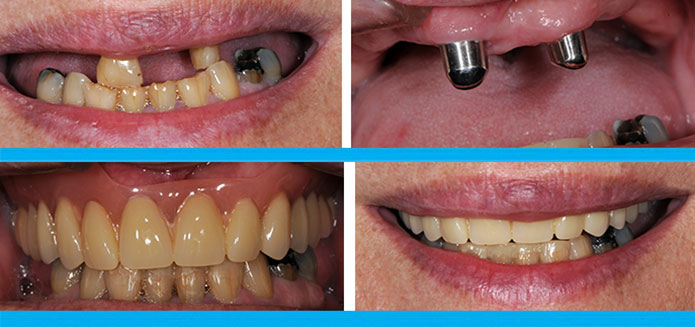Project Description
Telescopic Dentures – German Technology New To Australia
Dr. Florian Mack offers this new denture technology to Australia to all patients in his practice both in Brisbane or Southport on the Gold Coast. This is a really affordable alternative at half the cost to implant dentures or All-on-4. Even better, they can be made in a few weeks.
This fixed but removable telescopic denture allows for ease of cleaning and simplicity of denture repair if required. This video below will give you a better understanding of how this denture technology works.
Dr Florian Mack has been treating patients with telescopic dentures since 1992 and has been working with his current dental laboratory on telescopic dentures since 1996. He has been teaching Telescopic dentures since 1993, as well as supervising undergraduate students in Telescopic dentures in Germany from 1996 to 2006. Training for undergraduate students is part of the dental practical training.
Telescopic dentures that’s developed in Germany is supported by health insurance in Germany. This sensitive technique requires an excellent dental laboratory preferably with dental technicians trained in Germany and should only be done by experienced specialist in Prosthodontics. Dr Florian Mack is the first lecturer in Australia for Telescopic dentures and has given numerous presentations about telescopic dentures in Australia and internationally since 2006.
How do telescopic dentures work?
The way telescopic dentures works, is the dentures are held in place using telescopic crowns on your own teeth, without seeing or using any hooks being connected to the denture. They were invented in Germany by Professor Koerber in 1968 as a German precision partial denture (without clips). In most cases, telescopic dentures don’t affect your speech.
How are telescopic dentures fitted?
One telescopic crown or an inner cap is cemented permanently onto your tooth, the other outer cap on top looks like your teeth and combines with your denture. If you can imagine two cups representing the two crowns being stuck together, when you pull them apart you feel resistance. This is how the telescopic denture is held in place.
The remaining teeth are prepared with a drill so that a ‘cone’ crown can be fitted over the tooth. This crown is in the shape of a cone with a 5° taper, and not the normal bell-shape of a natural tooth. This cone crown is technically called a primary crown and it is permanently cemented over the prepared tooth.
If a sufficient number of secondary crowns are incorporated into the body of the partial denture there is no need to cover the palate (roof of the mouth).

1. Teeth after preparation for telescopic denture on 3 telescopic crowns – 2. Primary telescopic crowns cemented – 3. Telescopic denture inserted and sliding onto the primary telescopic denture
How many teeth are needed to support Telescopic Dentures?
Telescopic Dentures can be fitted to a few remaining teeth but need the support of a minimum of two teeth per jaw. Ideally, one on each side, usually only between 2-6 teeth are required. The denture may also extend to 6 -8 teeth. It depends on the condition of your teeth. If you lose teeth later or years down the track, teeth can be added to the dentures, so there is no need for new dentures to be remade.

Before & After – Lower jaw with immediate chrome cobalt denture
Can you attach telescopic dentures to dental implants?
Yes. If you have had implants telescopic dentures can be attached to those implants. Telescopic Dentures classically fit cone crowns on natural teeth but can also fit abutments on implant fixtures, similar to Syncone All-on-4 Implant Dentures.

Can you put telescopic dentures to mobile teeth?
Yes, telescopic dentures can even be used on slightly mobile teeth where most dentists would actually extract those teeth for a full denture or implants. That is not necessary with telescopic dentures. So it’s a double advantage here because it’s more cost-effective as opposed to All-on-4 or other implant solutions, so you don’t need implant surgery when you have a few teeth.
What are telescopic dentures made from?
Because the plate itself is made from Chrome Cobalt, which is a high bio-compatible material, it’s accepted by the body and not rejected. This has been used in dentistry and medicine for many decades. In telescopic dentures, it’s been used since 1982 and it’s a good strong material. The actual teeth are made out of composite, so the colour can be made to suit or match any desired colour.

Before & After of upper telescopic denture fitted after two visits.
The cone crown is made from a variety of materials including cast stainless steel and zirconia. A secondary crown made of the same material is designed to frictionally fit intimately over the cone crown and is incorporated into the telescopic denture. In actual fact, the amount of retentive force required to unseat the Telescopic Denture is about 2kg.
Does food get trapped in telescopic dentures?
Food entrapment occurs when you don’t have the right design or fitment. You need the right team of dental technicians and a dental specialist to have the perfect fit. Dr. Florian Mack is the person you want making your Telescopic Dentures to illuminate this problem.

Dr. Florian Mack is a Denture Specialist & Prosthodontist with branch locations at our Brisbane City practice or Southport on the Gold Coast. Please give us a call 07 3221 0443 or Contact Us and we will arrange a consultation at your convenience.
